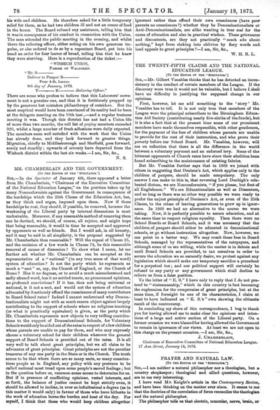MR. CHAMBERLAIN AND THE GOVERNMENT.
[TO THE EDITOR OF THE "SPECTATOR.")
SIN—In the Spectator of January 4th, there appeared a letter from Mr. Chamberlain, "Chairman of the Executive Committee of the National Education League," on the position taken up by many Nonconformists against the Government in consequence of the hardships which the 25th Clause of the Education Act, has, as they think and argue, imposed upon them. Now if these hardships be real, they should, if possible, be removed, because the weakening of the Liberal party by internal dissensions is most undesirable. Moreover, if any reasonable method of removing them can be devised, we should, of course, all rejoice, and might hope that being reasonable, it would in time be accepted and approved by opponents as well as friends. But I would ask, in all honesty, and it may be said in all simplicity, is the proposal suggested by Mr. Chamberlain thus reasonable? Will the repeal of Clause 25, and the omission of a few words in Clause 74, be this reasonable removal of causes of dissension? To show what I mean, let me further ask whether Mr. Chamberlain can be accepted as the representative of a " national" (in any true sense of that word) system of education ? Is not the party which he represents as much a " sect " as, say, the Church of England, or the Church of Rome ? Has it no dogmas, or to avoid a much misunderstood and sadly abused word, has it no settled tenets, no pronounced opinions, no profound convictions? If it has, then not being universal or national, is it not a sect, and would not the system of education advocated by it !seriously offend the consciences of many contributors to Board School rates ? Indeed I cannot understand why Denom- inationalists might not with as much reason object against largely contributing to the support of schools where no religious teaching (or what is practically equivalent) is given, as the party which Mr. Chamberlain represents now objects to very trifling contribu- tions to the support of Denominational Schools, for Voluntary Schools wouldonly be aided out of the rates in respect of a few children whose parents are unable to pay for them, and who may expressly choose a voluntary school for their children wherever the general support of Board Schools is provided out of the rates. It is all very well to talk about great principles, but we all claim to be advocates of great principles. Great principles are not the peculiar treasures of any one party in the State or in the Church. The truth seems to be that where there are so many sects, so many conscien- tious people as in England, any policy with any pretence to be called national must tread upon some people's sacred feelings ; but in the question before us, common-sense seems to determine for us. But if in presence of conflicting opinions, vested interests, and so forth, the balance of justice cannot be kept strictly even, it should be allowed to incline, in ever so infinitesimal a degree (as in this matter it would only) in favour of those who have hitherto in the work of education borne the burden and heat of the day. For myself, I think that those who would keep children altogether
ignorant rather than offend their own consciences (have poor parents no consciences ?) whether they be Denominationalists or Anti-Denominationalists, are alike wanting in true zeal for the- cause of education and also in practical wisdom. These grievances and discontents, are they not practically "much ado about nothing," kept from sinking into oblivion by fiery words and loud appeals to great principles ?—I am, Sir, fix., W. H. R. L.


































 Previous page
Previous page